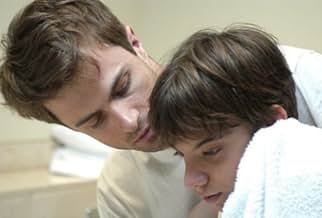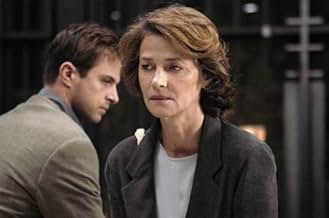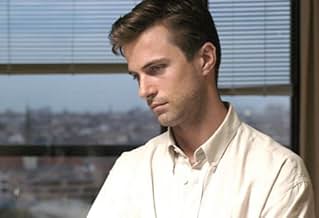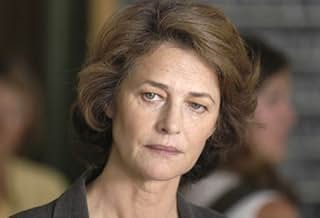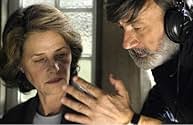AVALIAÇÃO DA IMDb
7,1/10
2,5 mil
SUA AVALIAÇÃO
Adicionar um enredo no seu idiomaMeeting his disabled son for the first time, a young father attempts to forge a relationship with the teenager.Meeting his disabled son for the first time, a young father attempts to forge a relationship with the teenager.Meeting his disabled son for the first time, a young father attempts to forge a relationship with the teenager.
- Direção
- Roteiristas
- Artistas
- Prêmios
- 15 vitórias e 22 indicações no total
Avaliações em destaque
I just saw this film, and since I don't like to talk about scenes in the film because I don't wish to spoil it for those who haven't seen it, I wanted to at least give my recommendation, and high praise for this piece. This is a film you have to see for yourself, the performances delivered are some of the best I have ever seen. It is so deeply moving and touching. My face was literally a faucet through the whole film, and I don't recall ever seeing and film that made that happen to me. As an actress myself, I can only hope to someday deliver performance such as the ones in this movie. There is so much said in this film without words, I was so deeply impressed. Needless to say, I give this 10 stars, and I heartily recommend it to everyone. *Note: It helps to have a box of Kleenex and a strong heart to watch this, also if you watch this and don't get "any" of it (for I know some may have trouble) you need to watch it again, because everything that needs to be said is there and more*
This movie could have been extremely heartwarming, considering the handicaps of the young boy and his struggles to be a functioning part of society, along with his relationship with his 'new' dad. I was expecting such tremendous emotion and drama, and the story left me with so many questions about the normalcy of it all. One thing that really disturbed me, and I'm suspecting this to be as a result of it being a foreign film, is that as cheesy as it sometimes may be, the film was sorely lacking background music. That missing element made the experience dry compared to what it could have been. The young boy playing Andrea was absolutely inspiring, though, and I found myself wondering how it must have been for him to memorize lines and follow directions in the making of this movie. Charlotte Rampling performed beautifully and convincingly. The father was just plain beautiful; I had a difficult time figuring out his character. My recommendation for this film is really 50-50.
Story about love, duty and the shadows of past. About the touch of two different worlds, about a child and his father and the forms of beauty and freedom. A movie about essential things of passing days and the heart of words, images and appearances. A film of an actor, the impressive Andrea Rossi, delicate, expressive, natural. Basic, manifesto for understand a disease. In fact, lesson about the science to discover the other. About the way for be yourself. A film as a water. Colors, nuances, gravel. And subtle interpretation of Charlotte Rampling, the strain of Stuart Rossi's character and the gestures of special star - Andrea Rossi. Touching, profound and natural. A movie like a time of world's contemplation in deep silence. As walk on the beach in the evening. Or a time of talk with your feelings.
Director Gianni Amelio coaxed a wonderful performance from Andrea Rossi in this film - his lines were fed to him by the director, allowing this young non-actor to appear spontaneous. His charm and his stubbornness were powerful and endearing, and it would seem that it was the boy's real character and personality that were being very gently and cleverly allowed to shine.
Apart from Andrea Rossi, the strength of the film lay with Charlotte Rampling - although her part was a supporting role, her intelligence and dignity made a strong impact, and you wished that she would be there to counsel and guide Gianni through future events that he would perhaps not handle too well. She has matured into a very fine actress indeed, and one hopes that she will get the kind of roles she deserves in the future.
My first thought was that Kim Rossi-Stuart wasn't a good choice for the lead - good-looking certainly, but way too wooden an actor to carry a role as demanding as that of Gianni. On reflection, however, I wondered if casting an actor who appeared to have very little to give his role emotionally was deliberate, because it wasn't hard to believe that this was a man who deserted his son at his birth. Even when he slowly began to warm to his son, and we knew he desperately wanted to help, he was still awkward as he tried to compensate for his instinctive emotional detachment.
When he took his son from the hospital - clearly before his round of treatment was completed (this would certainly have to be an ongoing routine for Paolo) - this was not the action of a responsible, loving father but an act of rebellion from an immature man who couldn't, or wouldn't, see that the painful procedures were the only hope for some small improvement in Paolo's condition, and something that the boy himself accepted and participated in, however much he hated it.
Taking Paolo to Norway to visit his "girlfriend" Kristine was not an act of kindness, but one of insensitivity - in earlier scenes, although Paolo spoke of one day marrying her, he also had all sorts of excuses for not being able to meet her. Clearly, he was able to understand what his father could not - that she may reject him when she realised that he was not like other boys; yet he trusted his father enough to take the chance. It was when Gianni threw away his walking stick that I felt he had made very little progress from the boy who couldn't face up to his responsibilities to his motherless son - he was acting less from a desire to help Paolo walk on his own than he was trying to pretend that the boy's disabilities could be cured by an act of will and that he would one day be more like a "normal" son. This was explored further during the driving scene - having told Nicole earlier that Paolo didn't know how to construct boundaries, he encouraged him to think that he could drive and was then shattered when he realised the extent to which his son could at times fail to recognise the limitations that would always confront him. Was Paolo himself unconsciously trying to teach his father a lesson by behaving in the same irresponsible way that Gianni had been?
The ending of the film therefore presented us with two possibilities - Gianni's newly-awakened love might lead him to a new sense of maturity and responsibility if he could accept that love was not going to be a miracle cure, or he just might once again abandon his child to others. For Paolo's sake and his father's too, I'd like to think that Gianni would have developed a new perspective on his physical and emotional journey with his difficult and beautiful son.
Apart from Andrea Rossi, the strength of the film lay with Charlotte Rampling - although her part was a supporting role, her intelligence and dignity made a strong impact, and you wished that she would be there to counsel and guide Gianni through future events that he would perhaps not handle too well. She has matured into a very fine actress indeed, and one hopes that she will get the kind of roles she deserves in the future.
My first thought was that Kim Rossi-Stuart wasn't a good choice for the lead - good-looking certainly, but way too wooden an actor to carry a role as demanding as that of Gianni. On reflection, however, I wondered if casting an actor who appeared to have very little to give his role emotionally was deliberate, because it wasn't hard to believe that this was a man who deserted his son at his birth. Even when he slowly began to warm to his son, and we knew he desperately wanted to help, he was still awkward as he tried to compensate for his instinctive emotional detachment.
When he took his son from the hospital - clearly before his round of treatment was completed (this would certainly have to be an ongoing routine for Paolo) - this was not the action of a responsible, loving father but an act of rebellion from an immature man who couldn't, or wouldn't, see that the painful procedures were the only hope for some small improvement in Paolo's condition, and something that the boy himself accepted and participated in, however much he hated it.
Taking Paolo to Norway to visit his "girlfriend" Kristine was not an act of kindness, but one of insensitivity - in earlier scenes, although Paolo spoke of one day marrying her, he also had all sorts of excuses for not being able to meet her. Clearly, he was able to understand what his father could not - that she may reject him when she realised that he was not like other boys; yet he trusted his father enough to take the chance. It was when Gianni threw away his walking stick that I felt he had made very little progress from the boy who couldn't face up to his responsibilities to his motherless son - he was acting less from a desire to help Paolo walk on his own than he was trying to pretend that the boy's disabilities could be cured by an act of will and that he would one day be more like a "normal" son. This was explored further during the driving scene - having told Nicole earlier that Paolo didn't know how to construct boundaries, he encouraged him to think that he could drive and was then shattered when he realised the extent to which his son could at times fail to recognise the limitations that would always confront him. Was Paolo himself unconsciously trying to teach his father a lesson by behaving in the same irresponsible way that Gianni had been?
The ending of the film therefore presented us with two possibilities - Gianni's newly-awakened love might lead him to a new sense of maturity and responsibility if he could accept that love was not going to be a miracle cure, or he just might once again abandon his child to others. For Paolo's sake and his father's too, I'd like to think that Gianni would have developed a new perspective on his physical and emotional journey with his difficult and beautiful son.
This film is remarkable for doing what I would have considered completely impossible, namely featuring a young boy who is severely handicapped as the lead actor, and succeeding brilliantly. The boy is Andrea Rossi, and his performance is one of the great cinema performances of the decade. I don't know how this was possible. Even allowing for the obvious fact that the director, Gianni Amelio, is a man of unique sensitivity and even of genius, I do not know how such a handicapped boy could be such a super-star. It is totally astounding. Those of us who have known handicapped people realize how charming they can be in private. But the idea that a boy so seriously handicapped could totally dominate an entire feature film and be so up-front, and project his personality so powerfully, is absolutely incredible. This is some kind of magic hitherto unknown! Andrea Rossi is not only honest and direct, he is a communicator at a major level. He proves what fantastic talents lie buried deep within people suffering from certain handicaps, and which never emerge because no opportunity ever presents itself. Really, there are no words to express the astonishment and delight with which any honest person would greet the experience of this screen performance by a boy who can barely walk, can barely write, and is handicapped in so many ways (I have no idea of what his illness really is) that he could easily be dismissed by the thoughtless as being unable to participate in normal human society or indeed to have any worth or importance as an individual human being. Andrea Rossi has struck a blow for all handicapped people everywhere, by proving beyond any doubt that appearances can be deceptive, and that someone who looks hopelessly handicapped and barely able to communicate can in actuality be highly alert, intelligent, witty, sensitive, creative, innovative, self-deprecating, amusing, and loving. What an amazing fellow Andrea Rossi is! And he was only twelve years old when he made this film! As for the others in the film, there are spectacular performances also by Kim Rossi Stuart as the boy's father, and Charlotte Rampling as the mother of a more severely handicapped girl. The film is so emotional, so powerful, that you will rarely see anything more moving in your lifetime. The direction is perfect. Everything is perfectly judged and perfectly executed. The interviews with Rampling and Rossi Stuart on the DVD are important and should be watched. I had no idea what a profound thinker and intellectual Rampling is until I saw her talking to the camera about the meaning and significance of this film. She should write books on the philosophy of the cinema. But probably her performances are her philosophy, expressed directly, and aimed straight for the gut. How amazing this film is in every way!
Você sabia?
- CuriosidadesAndrea Rossi suffers from muscular dystrophy in real life.
- ConexõesReferenced in O Amor Não Tira Férias (2006)
Principais escolhas
Faça login para avaliar e ver a lista de recomendações personalizadas
- How long is The Keys to the House?Fornecido pela Alexa
Detalhes
- Data de lançamento
- Países de origem
- Central de atendimento oficial
- Idiomas
- Também conhecido como
- The Keys to the House
- Locações de filme
- Empresas de produção
- Consulte mais créditos da empresa na IMDbPro
Bilheteria
- Faturamento bruto mundial
- US$ 4.537.451
- Tempo de duração1 hora 51 minutos
- Cor
- Mixagem de som
- Proporção
- 1.85 : 1
Contribua para esta página
Sugerir uma alteração ou adicionar conteúdo ausente

Principal brecha
By what name was As Chaves de Casa (2004) officially released in Canada in English?
Responda
